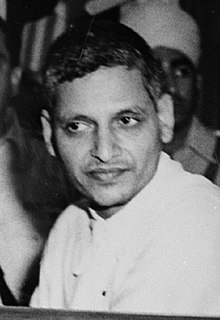
Nathuram Vinayak Godse was the assassin of Mahatma Gandhi, who shot Gandhi in the chest three times at point blank range in New Delhi on 30 January 1948. Godse, a Hindu nationalist from Pune, who believed Gandhi to have favoured the political demands of India's Muslims during the partition of India, plotted the assassination with Narayan Apte and six others. After a trial that lasted over a year, Godse was sentenced to death on 8 November 1949. Although pleas for commutation were made by Gandhi's two sons, Manilal Gandhi and Ramdas Gandhi, they were turned down by India's prime minister Jawaharlal Nehru, deputy prime minister Vallabhbhai Patel, and the Governor-General C. Rajagopalachari. Godse was hanged in the Ambala Central Jail on 15 November 1949.

Arun Shourie is an Indian economist, journalist, author and politician. He has worked as an economist with the World Bank, a consultant to the Planning Commission of India, editor of the Indian Express and The Times of India and a Minister of Communications and Information Technology in the Vajpayee Ministry (1998–2004). He was awarded the Ramon Magsaysay Award in 1982 and the Padma Bhushan in 1990.
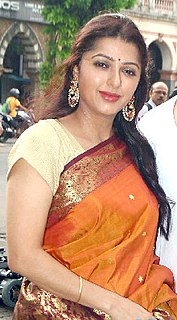
Bhumika Chawla is an Indian actress and a former model. She made her film debut in the Telugu film Yuvakudu (2000) and has since then worked in various Indian film industries and appeared in over fifty films in Telugu, Hindi, Tamil, Malayalam, Kannada, Bhojpuri, and Punjabi. Her notable performances include appearances in films such as Kushi (2001), Okkadu (2003), Tere Naam (2003), Missamma (2003), Sillunu Oru Kaadhal (2006), Gandhi, My Father (2007), Anasuya (2007), Buddy (2013), M.S. Dhoni: The Untold Story, MCA (2017), and U Turn (2018). She has won 4 Nandi Awards, 1 Filmfare Awards South, 1 SIIMA award, 1 Zee Cine award, and 1 Zee Apsara award
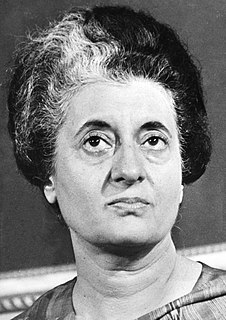
In India, "The Emergency" refers to a 21-month period from 1975 to 1977 when Prime Minister Indira Gandhi had a state of emergency declared across the country. Officially issued by President Fakhruddin Ali Ahmed under Article 352 of the Constitution because of the prevailing "internal disturbance", the Emergency was in effect from 25 June 1975 until its withdrawal on 21 March 1977. The order bestowed upon the Prime Minister the authority to rule by decree, allowing elections to be canceled and civil liberties to be suspended. For much of the Emergency, most of Indira Gandhi's political opponents were imprisoned and the press was censored. Several other human rights violations were reported from the time, including a mass forced sterilization campaign spearheaded by Sanjay Gandhi, the Prime Minister's son. The Emergency is one of the most controversial periods of independent India's history.

Adoor Gopalakrishnan is an Indian film director, script writer, and producer. and is regarded as one of the most notable filmmakers in India. With the release of his first feature film Swayamvaram (1972), Adoor pioneered the new wave in Malayalam cinema during the 1970s. In a career spanning over five decades, Adoor has made only 12 feature films to date. His films are made in the Malayalam language and often depict the society and culture of his native state Kerala. Nearly all of his films premiered at Venice, Cannes and Toronto International Film Festival. Along with Satyajit Ray and Mrinal Sen, Adoor is one of the most recognized Indian film directors in world cinema.

Jo Jeeta Wohi Sikandar is a 1992 Indian Hindi-language coming-of-age sports film, directed and co-written by Mansoor Khan, and produced and co-written by Nasir Hussain. The film stars Aamir Khan, Ayesha Jhulka, Deepak Tijori, Pooja Bedi, Mamik Singh and Kulbhushan Kharbanda, whilst Aamir's brother Faisal Khan makes a special appearance. The music was by Jatin Lalit. Jo Jeeta Wohi Sikandar won two Filmfare Awards, including Best Film. The movie was shot at Kodaikanal. It is based on the 1979 American movie Breaking Away.

Nandalal Bose was one of the pioneers of modern Indian art and a key figure of Contextual Modernism.
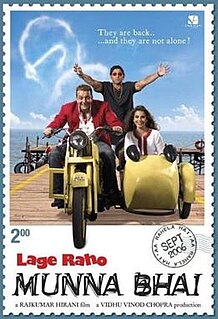
Lage Raho Munna Bhai is a 2006 Indian Hindi-language comedy-drama film directed by Rajkumar Hirani and produced by Vidhu Vinod Chopra. It is the follow-up to the 2003 film Munna Bhai M.B.B.S. with Sanjay Dutt reprising his role as Munna Bhai, a Mumbai underworld don. In Lage Raho Munna Bhai, the eponymous lead character starts to see the spirit of Mahatma Gandhi. Through his interactions with Gandhi, he begins to practice what he refers to as Gandhigiri to help ordinary people solve their problems.

Sushma Swaraj was an Indian politician and a Supreme Court lawyer. A senior leader of Bharatiya Janata Party, Swaraj served as the Minister of External Affairs of India in the first Narendra Modi government (2014–2019). She was the second woman to hold the office, after Indira Gandhi. She was elected seven times as a Member of Parliament and three times as a Member of the Legislative Assembly. At the age of 25 in 1977, she became the youngest cabinet minister of Indian state of Haryana. She also served as 5th Chief Minister of Delhi for a short duration in 1998 and became the First female Chief Minister of Delhi.
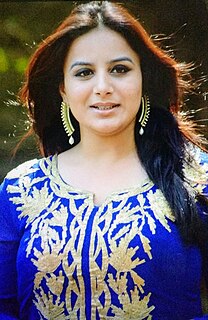
Pooja Gandhi is an Indian film actress and producer, who mainly works in Kannada language films and also appears in Tamil, Malayalam, Bengali and Hindi. Gandhi after starring in the commercially successful 2006 film Mungaru Male, became one of the most popular and highest paid actresses in Kannada cinema and also the recipient of several awards. Gandhi popularly came to be known as 'Male Hudugi' in the media and Kannada film industry.
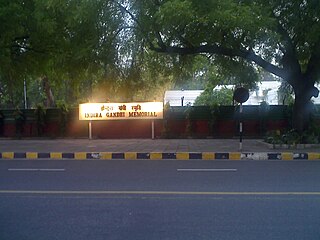
Indian Prime Minister Indira Gandhi was assassinated at 9:29 a.m. on 31 October 1984 at her residence in Safdarjung Road, New Delhi. She was killed by her Sikh bodyguards Satwant Singh and Beant Singh in the aftermath of Operation Blue Star. Operation Blue Star was an Indian military action carried out between 1 and 8 June 1984, ordered by Indira Gandhi to remove the Sikh Jarnail Singh Bhindranwale and his followers from the holy Golden temple of the Harmandir Sahib in Amritsar, Punjab. The collateral damage included the death of many pilgrims, as well as damage to the Akal Takht. The military action on the sacred temple was criticized by Sikhs both inside and outside India.
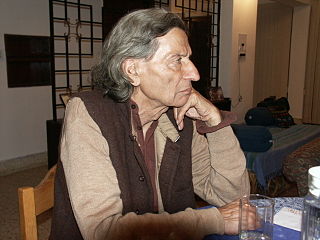
Keshav Malik was an Indian poet, art and literary critic, arts scholar, and curator. He remained art critic for the Hindustan Times (1960–1972) and The Times of India (1975–2000). He published eighteen volumes of poetry and edited six anthologies of English translations of Indian poetry.
Karan Gera is an artist. He is one of the youngest ever to win the Lalit Kala Akademi award. Recently he completed a solo exhibition at the Indian Council for Cultural Relations. His recent exhibition Grand India has been critically acclaimed by veteran artist Satish Gujral and South African painter Marlene Dumas.
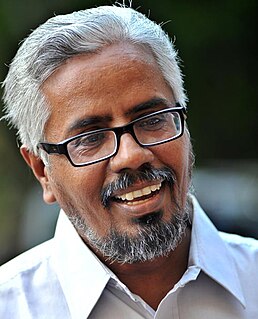
Venkiteswaran Chittur Subramanian is an Indian film critic, professor, documentary filmmaker, writer and occasional subtitler from Chalakudi, Kerala, India, who writes predominantly in English and Malayalam. He won the National Film Award for Best Film Critic in 2009.

{{Infobox person | name = Apurba Kishore Bir | image = Apurba Kishor Bir.jpg | caption = Bir in 2016 | birth_name = | birth_date = 1948 (age 72–73) | birth_place = Odisha, India | residence = | ethnicity = | education = | alma_mater = Film and Television Institute of India | occupation = Cinematographer, director | years_active = 1973–present | employer = | organization = | agent = | known_for = | notable_works = | home_town = | religion = | children = | parents = Ajoy Chandra Bir

Kailash Chandra Meher is an Indian artist, inventor, and social activist. He is a painter of contemporary modern art paintings and traditional Tussar Pattachitra paintings of Odisha. He was a recipient of the Padma Shri by the Government of India in 2013.
Navni Parihar is an Indian film and television actress. Navni Parihar acted in the film Rabba Main Kya Karoon in 2013 starring Arshad Warsi. Navni is married to Animesh. Navni is also playing an important role in Bani - Ishq Da Kalma, which was earlier titled as Gurbani. Navni, who has worked two decades in Bollywood, also played Indira Gandhi in the Shekhar Kapoor documentary series Pradhanmantri, and 7 RCR .

Biman Bihari Das is an Indian sculptor and former Principal of the Government College of Art & Craft, Kolkata. He was honoured by the Government of India, in 2014, by bestowing on him the Padma Shri, the fourth highest civilian award, for his services to the field of Fine Arts.

Bhairab Dutt Pande was a member of the Indian Civil Service and Union Cabinet Secretary of the Government of India under Indira Gandhi. He served as the Governor of West Bengal (1981–1983), and Punjab (1983–1984), and the Administrator of Chandigarh for a brief period.

Randeep Maddoke is a Punjab-based concept photographer and documentary filmmaker, born and raised in the village Maddoke, Moga (Punjab). Randeep, an activist turned photographer, is known for his focus on the pains of the marginalised sections of society which are constantly subject to a systematic social exclusion.


















